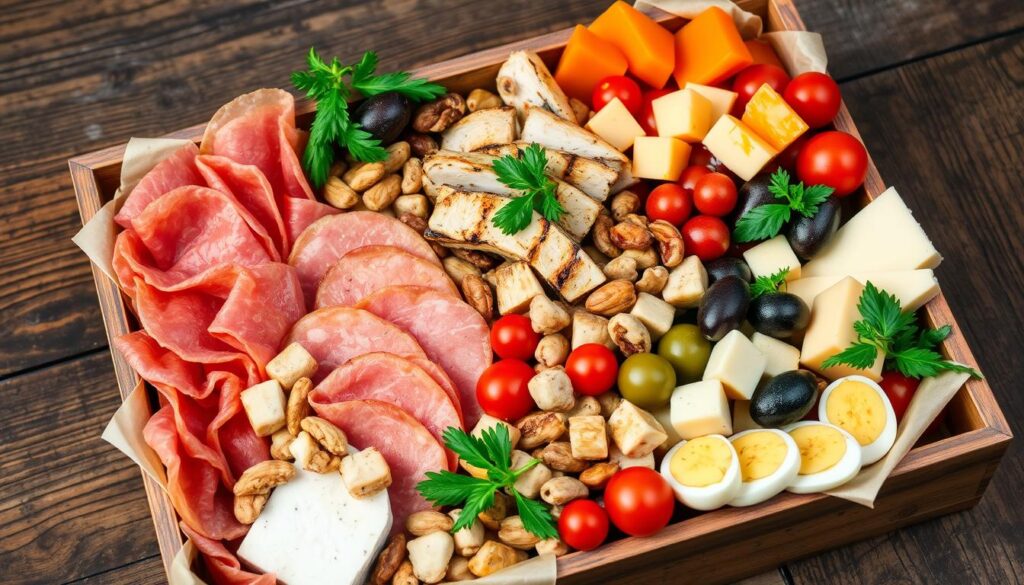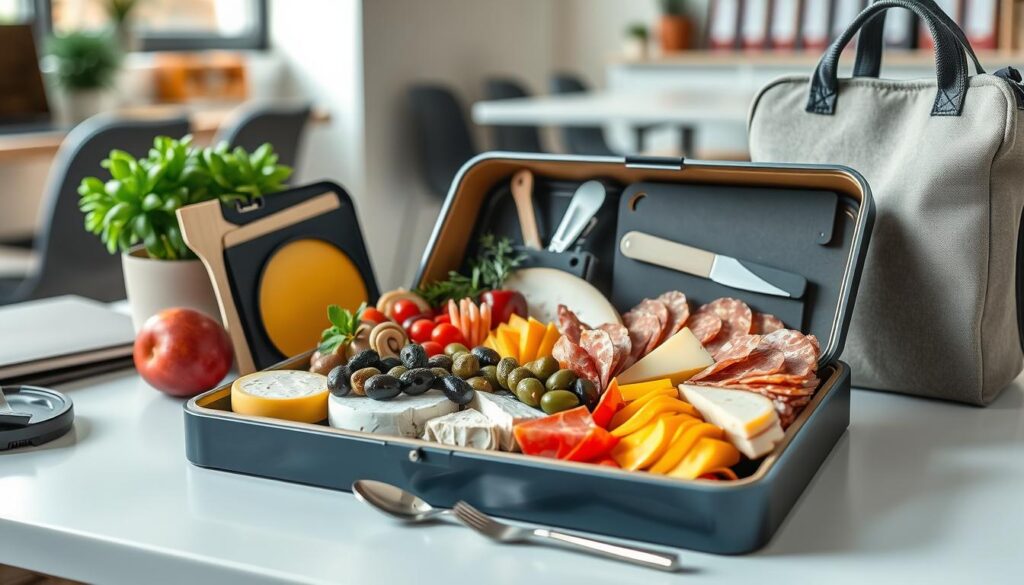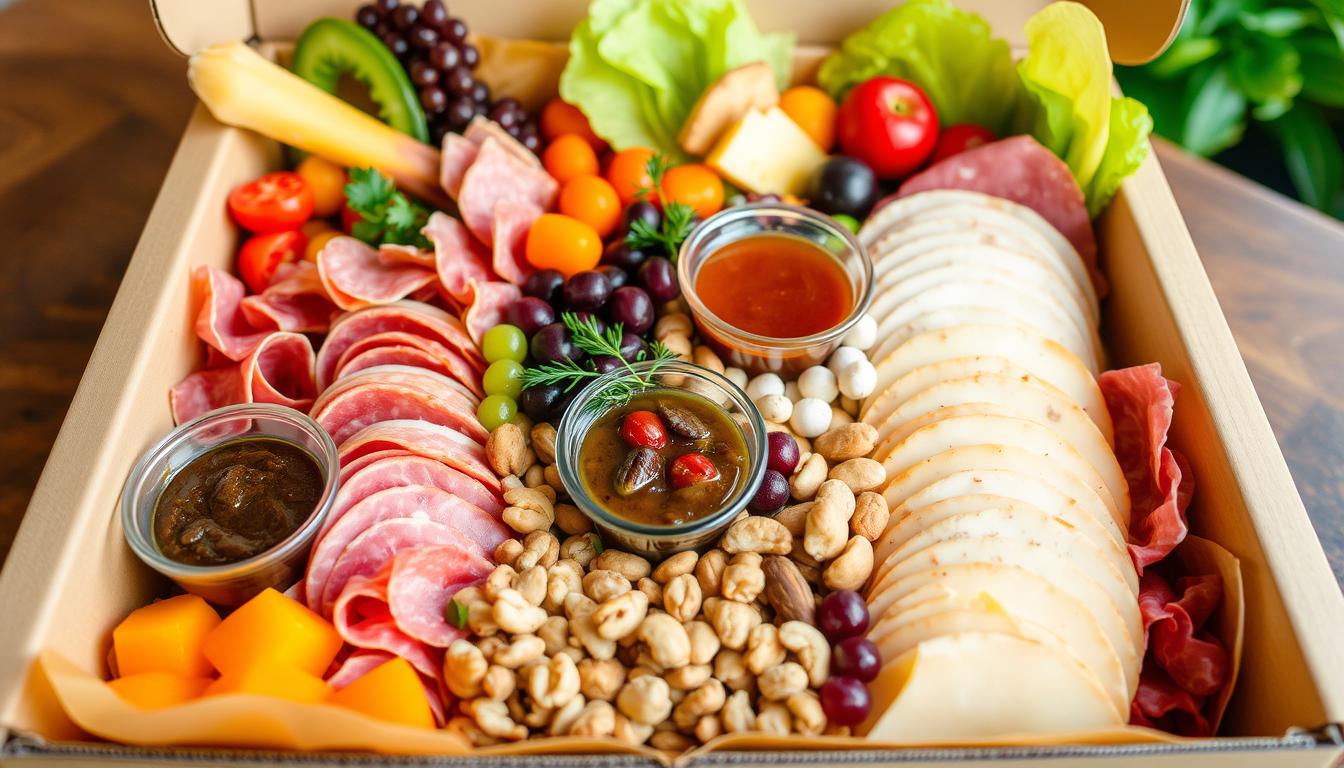Starting the day with a boring sandwich can make it feel dull. But, what if you could turn your lunch into a flavorful adventure? Charcuterie box lunches are a fun and customizable way to eat at work or school.
These lunches are inspired by European charcuterie shops. They mix meats, cheeses, and sides in a way that’s both tasty and pretty. They’re great for anyone looking to spice up their lunch or for parents wanting a healthier option for school.
Table of Contents
Charcuterie Box Lunch Recipes
Understanding the Art of Charcuterie Box Lunches
Charcuterie box lunches are a hit, offering a tasty and pretty way to enjoy lunch. They mix cured meats, cheeses, fresh fruits, and tasty sides. This mix not only tastes great but also gives you a healthy meal.
Benefits of Charcuterie Box Lunches
Charcuterie box lunches are great because they’re flexible. You can try different tastes and textures in one meal. They help you eat well and feel good all day.
Essential Components of a Perfect Box
- Protein-rich elements such as cured meats, hard cheeses, and boiled eggs
- Carbohydrate sources like crackers, bread, or dried fruit
- Fresh, vibrant produce like grapes, cherry tomatoes, and crunchy vegetables
- Flavor-enhancing extras like olives, pickles, jams, and nuts
A perfect charcuterie box balances taste and nutrition. Each part should work well together and match your taste.
Time-Saving Preparation Tips
To make charcuterie boxes easy to prepare, prep some ingredients early. Cut meats, cheeses, and fruits ahead of time. Keep them fresh in airtight containers. Use special lunch boxes or bento containers to keep things neat and pretty.
| Portion Recommendations | For 150 Guests | For 200 Guests |
|---|---|---|
| Meat | 9.5 pounds | 12.5 pounds |
| Cheese | 9.5 pounds | 12.5 pounds |
With these tips, you can make tasty and healthy charcuterie box lunches. They’ll make your lunchtime special and impress others.
“Considerations for creating an Instagram-worthy charcuterie board include capturing it from different angles, utilizing natural light for photos, and zooming in for close-ups to highlight details.”
Charcuterie Box Lunch Recipes
Core Elements for Building Your Box
Making a great meat and cheese platters, artisanal food pairings, and savory snack combinations in a charcuterie box is an art. The right mix of elements is key to a balanced and beautiful box. Let’s look at the essential parts that make your charcuterie box stand out.
Start with a variety of proteins like deli meats, cheeses, hard-boiled eggs, or plant-based options. These are the main energy sources. Next, add carbohydrates like whole-grain crackers, pita bread, or breadsticks for substance and crunch.
For freshness and color, include fruits and vegetables. Think juicy berries, crisp apple slices, cherry tomatoes, and cucumber spears. They add nutrition and make your box look great.
- Proteins: Deli meats, cheeses, hard-boiled eggs, plant-based options
- Carbohydrates: Whole-grain crackers, pita bread, breadsticks
- Fruits and Vegetables: Berries, apple slices, cherry tomatoes, cucumber spears
Don’t forget the extras that bring unique flavors and textures. Add olives, pickles, dried fruits, nuts, and small amounts of flavorful condiments or spreads. Mixing savory, sweet, and tangy elements makes your box delightful and complete.
The secret to a great charcuterie box is finding the right balance. With creativity and care, you can make artisanal food pairings that wow your guests or brighten up your workday lunches with savory snack combinations.
Charcuterie Box Lunch Recipes
Classic Charcuterie Box Lunch Recipes
Charcuterie boxes are a hit for lunch, mixing flavors and textures for everyone. You can find recipes for Mediterranean, European, and American-style boxes. These recipes will make your lunchtime special.
Mediterranean-Inspired Box
Experience the Mediterranean with a charcuterie box. It includes creamy hummus, tangy feta, briny olives, and soft pita. Add fresh grape tomatoes, cucumber slices, and olive oil for a perfect mix.
Traditional European Style
Explore Europe with a charcuterie box. It has savory meats like prosciutto, salami, and chorizo. Add creamy brie, sharp cheddar, and tangy blue cheese. Finish with artisanal bread, bread sticks, and gourmet mustards for a real European taste.
American Favorites Box
Try American classics in a charcuterie box. It has turkey, apple, and cheddar cheese. Add grapes, honey, crackers, nuts, and ranch dip for a satisfying lunch.
| Mediterranean-Inspired Box | Traditional European Style | American Favorites Box |
|---|---|---|
| Hummus, Feta Cheese, Olives, Pita Bread | Prosciutto, Salami, Chorizo, Brie, Cheddar, Blue Cheese, Artisanal Bread, Mustards | Turkey Slices, Cheddar Cheese, Apple Slices, Grapes, Honey, Crackers, Ranch Dip |
These charcuterie box recipes are a great way to enjoy lunch. They offer a mix of flavors and textures. You can make a lunch that suits your taste and needs. Enjoy the art of charcuterie with every bite!
Charcuterie Box Lunch Recipes
Protein-Packed Options for Energizing Workdays
Adding protein-rich foods to your lunch can change your workday. You can choose from meat or plant-based options. This variety keeps your energy up and makes you feel full all day.
Lean proteins like chicken, deli meats, and hard-boiled eggs are great for lunch. For those who don’t eat meat, try hummus, edamame, chickpeas, or cottage cheese. These foods are full of protein and other nutrients to help you stay energized.
Mixing different proteins in your lunch is a good idea. For example, pair turkey with Greek yogurt or add cheese and nuts. This not only looks good but also gives you a balanced diet to stay focused and energized.

Charcuterie board ideas
“Protein-rich snacks and meals are essential for maintaining energy levels and supporting muscle recovery throughout the workday.”
With a bit of planning, you can make tasty, protein-rich lunches. By mixing different proteins in your portable lunch fare, you’ll boost your productivity and tackle the day with confidence.
Charcuterie Box Lunch Recipes
Fresh and Colorful Produce Combinations
Make your picnic lunch boxes pop with fresh, colorful produce. Try adding berries, stone fruits, and citrus for a sweet and tangy touch. For a crunchy bite, include cherry tomatoes, cucumber slices, bell pepper strips, and carrot sticks.
Seasonal Fruit Selections
Choose the freshest seasonal fruits for your charcuterie boxes. Ripe strawberries, juicy peaches, or orange wedges add a sweet contrast to savory meats and cheeses. Pair these fruits with artisanal cheeses for a perfect flavor mix.
Vibrant Vegetable Pairings
Colorful veggies not only look great but also add texture. Try cherry tomatoes, cucumber slices, bell pepper strips, and carrot sticks. Serve them with dips or spreads for guests to create their own tasty bites.
Creative Garnishing Ideas
Add a personal touch to your charcuterie boxes with garnishes. Fresh herbs like rosemary, thyme, or basil add a fragrant flavor. Edible flowers or a sprinkle of toasted nuts or seeds can also enhance the look and taste.
| Fruit Selections | Vegetable Options | Garnishing Ideas |
|---|---|---|
|
|
|
With vibrant produce and creative garnishes, your picnic lunch boxes will impress. They’ll be both beautiful and delicious, making your charcuterie boxes a hit with your guests.
Charcuterie Box Lunch Recipes
Smart Storage and Packing Solutions
To keep your charcuterie box lunches fresh and appealing, use the right storage and packing. Use containers with separate parts to keep ingredients apart. Small containers or silicone cups are great for dips and spreads.
Arrange your portable lunch fare with the order of eating in mind. This way, everything stays fresh.
It’s important to keep wet and dry ingredients apart to avoid sogginess. For safe transport, use insulated picnic lunch boxes or cooler packs. This is especially true for items like meats and cheeses that need to stay cool.
- Use containers with separate compartments to prevent ingredient mixing.
- Employ small containers or silicone cups for dips and spreads.
- Pack items in the order of consumption to ensure freshness.
- Separate wet and dry ingredients to avoid sogginess.
- Utilize insulated lunch bags or cooler packs to maintain food safety.
| Packing Tip | Benefit |
|---|---|
| Use containers with compartments | Prevents ingredient mixing |
| Employ small containers for dips and spreads | Keeps them organized and separate |
| Pack items in order of consumption | Ensures freshness throughout the meal |
| Separate wet and dry ingredients | Avoids sogginess |
| Utilize insulated lunch bags or cooler packs | Maintains food safety, especially for perishables |

Charcuterie Box Lunch Recipes
By using smart storage and packing, your portable lunch fare stays fresh and looks good. Choose the right containers and accessories. This will make your picnic lunch boxes better and give you a great meal anytime, anywhere.
Dietary-Specific Charcuterie Box Variations
Charcuterie box lunches are very versatile. They can fit into many diets, like keto, vegetarian, or gluten-free. Let’s look at some tasty options for each diet.
Keto-Friendly Boxes
Charcuterie boxes are great for keto diets. Choose high-fat, low-carb foods like creamy cheeses and savory meats. Add crunchy nuts and keto-friendly veggies like cucumbers and bell peppers.
Finish with seeds and tangy dips like ranch or tzatziki.
Vegetarian Options
Vegetarian charcuterie boxes are just as good. Use plant-based proteins like hummus and roasted chickpeas instead of meat. Add cheeses, olives, pickled veggies, and crunchy crackers or veggie slices.
Don’t forget fresh berries or dried fruit for sweetness.
Gluten-Free Selections
Gluten-free diets can still enjoy charcuterie boxes. Replace crackers with gluten-free options like seed-based ones or veggie slices. Fill your box with cheeses, meats, nuts, and fresh fruits and veggies.
Charcuterie box lunches can be made to fit any diet. This means you can always enjoy a tasty, healthy meal, no matter your dietary needs.
Charcuterie Box Lunch Recipes
Creative Dips and Spreads for Enhanced Flavor
Make your charcuterie box lunches better with savory snack combinations and artisanal food pairings. Dips and spreads add flavor and make your meal more versatile. Hummus, tzatziki, and guacamole are favorites, and specialty mustards can add a gourmet twist.
Nut butters are great for adding protein and go well with fresh fruits. A bit of jam or honey can also add sweetness. These additions not only boost flavors but also offer unique pairings that excite your taste buds.
Remember to keep dips and spreads in small, leak-proof containers. This prevents spills and keeps your other items fresh. With a bit of creativity, your charcuterie box can become a delightful and fulfilling lunch for work or school.
Charcuterie Box Lunch Recipes

